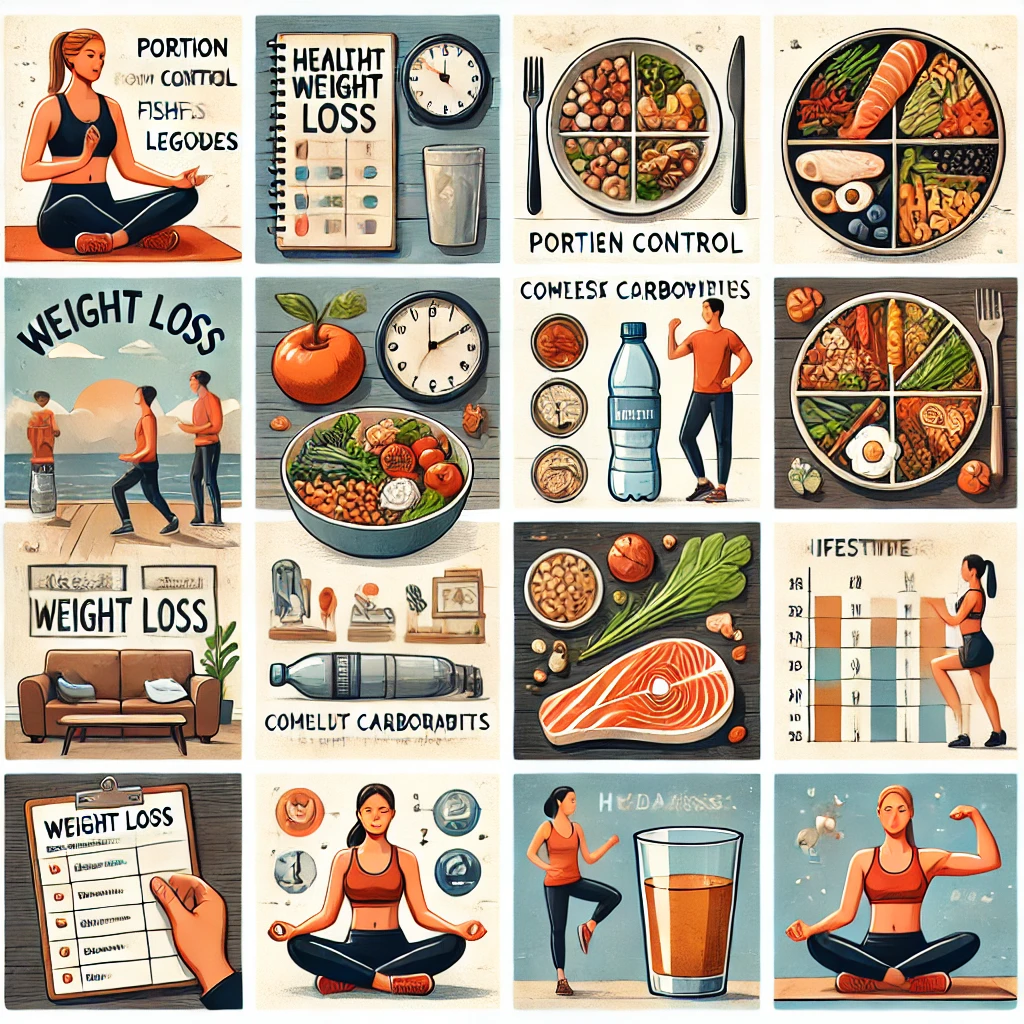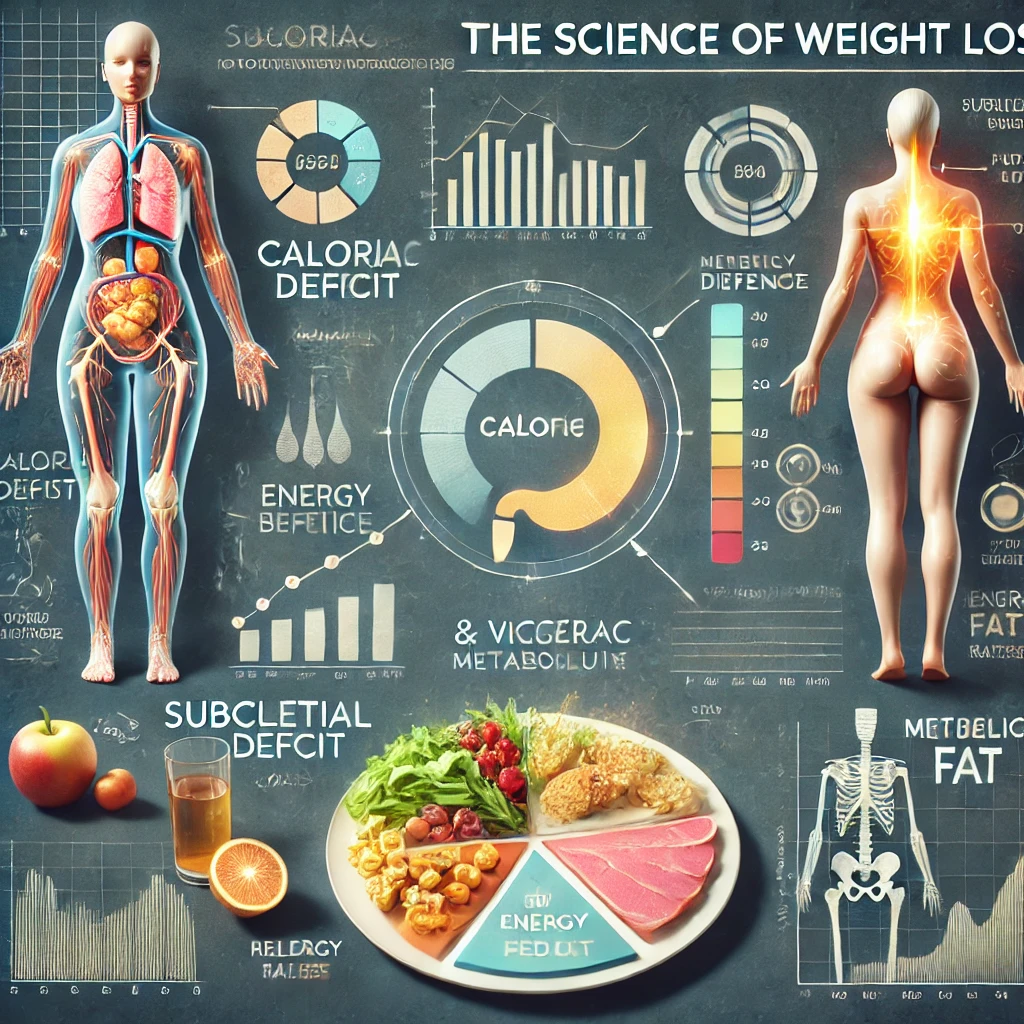
Losing weight is a journey that requires dedication, knowledge, and the right strategies. This guide covers science-backed techniques, lifestyle changes, and practical advice on how to lose weight safely and keep it off for good.
1. Understanding Weight Loss

1. The Science of Weight Loss
- Caloric Deficit: The core of weight loss lies in creating a caloric deficit. This means burning more calories than you consume. For example, if your body needs 2,000 calories per day to maintain its weight and you consume 1,500 calories, you’re creating a 500-calorie deficit, which can lead to weight loss.
- Metabolism: Metabolism determines how quickly your body burns calories. Factors like age, gender, muscle mass, and activity level impact metabolic rate. For example, a 30-year-old woman may have a different metabolic rate than a 60-year-old man, even if they have similar body compositions.
2. Types of Fat: Subcutaneous vs. Visceral
- Subcutaneous Fat: Located just under the skin, this type of fat is what you can pinch on your stomach or thighs. It’s not as harmful as visceral fat but still contributes to overall body weight.
- Visceral Fat: Found around vital organs like the liver and intestines, visceral fat increases the risk of chronic diseases like heart disease and diabetes. Studies show that visceral fat is more metabolically active, releasing fatty acids and inflammatory agents into the bloodstream. For instance, individuals with high visceral fat levels have a higher risk of insulin resistance.
3. Setting Realistic Goals
- Losing 0.5 to 1 kilogram (around 1 to 2 pounds) per week is generally recommended for sustainable weight loss. Setting small, achievable goals like losing 2 kg a month can help you stay motivated. Focusing on overall health—improved energy levels, better sleep, and enhanced mood—can be equally rewarding as watching the scale change.
2. Crafting a Balanced Diet Plan
1. Creating a Calorie Deficit
- Calculate your Total Daily Energy Expenditure (TDEE) using an online calculator to determine how many calories you burn daily based on age, sex, weight, height, and activity level. Subtracting 500-1,000 calories from your TDEE can result in a weekly weight loss of approximately 0.5 to 1 kg. However, be cautious not to cut calories too low, as this can lead to muscle loss, fatigue, and nutritional deficiencies.
2. Choosing the Right Macronutrients
- Protein: Protein preserves muscle mass during weight loss, with recommendations suggesting 1.6-2.2 grams per kilogram of body weight. For example, if you weigh 70 kg, aim for around 112-154 grams of protein daily. Sources include lean meats, legumes, and dairy.
- Healthy Fats: Fats support cell function, hormone production, and nutrient absorption. Sources like avocado, olive oil, and nuts provide healthy unsaturated fats, while trans fats (found in processed foods) should be avoided.
- Complex Carbohydrates: Opt for complex carbs like whole grains, vegetables, and legumes, which digest slower, keeping you full longer. For example, swapping white rice for brown rice can lead to more stable blood sugar levels and prolonged energy.
3. The Power of Portion Control
- Portion control is about managing the amount of food you consume. For instance, using smaller plates or bowls can help you eat less without feeling deprived. Try pre-portioning snacks instead of eating directly from large packages.
4. Hydration and Its Role in Weight Loss
- Drinking water helps maintain your metabolism and can reduce hunger. Studies have shown that drinking 500 ml of water 30 minutes before a meal can reduce calorie intake. The general recommendation is around 2-3 liters of water daily, but this varies by individual needs.
5. Special Diets for Weight Loss
- Ketogenic Diet: Focuses on high-fat, low-carb foods to push the body into ketosis, burning fat for fuel. While effective for some, it may lead to deficiencies if not balanced.
- Intermittent Fasting (IF): Alternates between periods of eating and fasting, which can help reduce calorie intake and improve insulin sensitivity. A popular form of IF is the 16:8 method, where you fast for 16 hours and eat within an 8-hour window.
3. Effective Exercise for Weight Loss
1. The Role of Exercise in Weight Loss
- Exercise helps create a caloric deficit and improves cardiovascular health. It also reduces the risk of metabolic disorders. Pairing diet and exercise generally results in more sustainable weight loss compared to diet alone.
2. Cardio Workouts for Weight Loss
- Steady-State Cardio: Includes activities like jogging, swimming, or cycling at a consistent pace. This is effective for burning calories but can be time-consuming.
- HIIT: Alternating between high-intensity exercises and rest periods, HIIT has been shown to burn calories more efficiently and increase post-exercise oxygen consumption (EPOC). For example, a 20-minute HIIT session can burn more calories than a 45-minute steady-state cardio workout.
3. Strength Training for Sustainable Weight Loss
- Lifting weights or resistance exercises build muscle, which burns more calories even at rest. Compound exercises like squats, deadlifts, and push-ups engage multiple muscle groups, making workouts efficient.
4. Creating a Workout Routine
- For beginners, aim for a combination of 3 days of cardio and 2 days of strength training per week. Include rest days to allow muscles to recover. For example:
- Day 1: Cardio (running or cycling)
- Day 2: Full-body strength training
- Day 3: Rest
- Day 4: Cardio (HIIT workout)
- Day 5: Lower body strength training
4. Psychological Aspects of Weight Loss
1. The Role of Motivation and Willpower
- Motivation is often high at the beginning of a weight-loss journey, but consistency is key. Setting daily goals, like cooking a healthy meal or completing a workout, can keep you motivated.
2. Overcoming Emotional Eating
- Emotional eating is often triggered by stress, boredom, or negative emotions. Keeping a food journal to identify emotional eating patterns can be helpful. For example, instead of reaching for comfort food when stressed, try a 5-minute meditation or go for a walk.
3. Mindful Eating for Better Results
- Mindful eating helps you become aware of hunger and satiety cues, reducing overeating. Techniques include eating slowly, savoring each bite, and focusing on food’s texture and flavor.
4. Building a Support System
- Having supportive friends, family, or joining a weight-loss community can increase accountability. For instance, research shows that people who join weight-loss programs with friends or family lose more weight and keep it off longer.
5. Lifestyle Changes for Weight Loss
1. Improving Sleep for Better Weight Management
- Poor sleep disrupts hunger hormones (ghrelin and leptin), leading to increased hunger and cravings. Aim for 7-9 hours of sleep per night to support weight loss.
2. Reducing Stress for Healthier Habits
- Chronic stress raises cortisol levels, which is associated with increased belly fat. Practicing stress-relief techniques like yoga, meditation, or deep breathing exercises can support your weight-loss goals.
3. Tracking Progress and Staying Accountable
- Regularly tracking your weight and food intake helps identify patterns and keep you accountable. Focus on non-scale victories like feeling more energetic, sleeping better, or noticing improved mood.
4. Consistency and Patience: The Key to Lasting Change
- Weight loss takes time, so stay consistent with your routines and avoid drastic changes. Remember, it’s about creating a sustainable lifestyle, not following quick-fix diets.
6: Common Weight Loss Myths Debunked
1. Myth: "You Have to Eat Less to Lose Weight"
- Quality matters as much as quantity. Nutrient-dense foods keep you fuller for longer. For example, a balanced meal with whole grains, lean protein, and vegetables is more satisfying than an equivalent calorie count in sugary snacks.
2. Myth: "Carbs Are the Enemy"
- Carbohydrates are essential for energy. Instead of cutting them out, opt for whole-grain carbs like oats and quinoa, which release energy slowly and keep you full.
3. Myth: "Fat Makes You Fat"
- Healthy fats (unsaturated fats) support brain function and hormone balance. Instead, it’s excessive sugar and refined carbs that are often stored as fat when not utilized.
4. Myth: "Weight Loss is All About Willpower"
- Factors like genetics, environment, and even sleep patterns play a significant role. Small changes in these areas often yield better results than relying on willpower alone.
7: Dealing with Plateaus
1. Why Plateaus Happen
- As you lose weight, your body requires fewer calories. Plateaus are a natural part of the process, caused by metabolic adaptation.
2. Strategies to Overcome Plateaus
- Adjust your calorie intake or try a new type of workout
FAQs on Weight Loss
1. How quickly should I expect to see weight-loss results?
Weight loss varies from person to person, but a safe and sustainable pace is around 0.5 to 1 kg (1-2 pounds) per week. Rapid weight loss is often difficult to maintain and can lead to muscle loss and nutrient deficiencies. Remember, consistency is more important than speed in achieving lasting results.
2. Do I need to count calories to lose weight?
Counting calories can be an effective tool, especially at the beginning, to understand portion sizes and calorie density in foods. However, it’s not necessary for everyone. Some people achieve success by focusing on portion control, eating mindfully, and choosing whole, nutrient-dense foods without strictly tracking calories.
3. Are “cheat days” okay during weight loss?
Occasional indulgences are okay and can help prevent feelings of deprivation. However, if a “cheat day” leads to excessive eating, it might set back your progress. Instead, try a more balanced approach by including moderate portions of your favorite foods occasionally. This allows you to enjoy treats without feeling like you’re cheating.
4. Can I lose weight without exercise?
Yes, you can lose weight through diet alone by creating a calorie deficit. However, exercise is highly beneficial for overall health and can make weight loss easier. Exercise boosts metabolism, preserves muscle mass, and offers mental health benefits. A combination of diet and exercise typically leads to more sustainable and healthy weight loss.
5. What are the best exercises for weight loss?
A combination of cardio (like running, cycling, or swimming) and strength training (like lifting weights or bodyweight exercises) is ideal for weight loss. Cardio burns calories, while strength training builds muscle, which increases your resting metabolism. High-Intensity Interval Training (HIIT) is also popular as it combines cardio and strength, making workouts efficient and effective.
6. Should I avoid carbs to lose weight?
Carbohydrates are not inherently “bad” and do not need to be avoided. Instead, focus on the types of carbs you consume. Choose complex carbs like whole grains, vegetables, and legumes, which provide sustained energy. Simple carbs, like sugars and refined grains, can lead to blood sugar spikes and cravings.
7. How much protein should I eat to lose weight?
Protein is essential for muscle maintenance during weight loss. A general guideline is 1.6 to 2.2 grams of protein per kilogram of body weight. For example, if you weigh 70 kg, aim for around 112 to 154 grams of protein per day. Good sources include lean meats, fish, eggs, dairy, legumes, and tofu.
8. Why am I not losing weight even though I’m eating less and exercising?
Weight loss plateaus are common and can happen for several reasons:
- Metabolic Adaptation: As you lose weight, your body needs fewer calories.
- Overestimating Calorie Burn: People often overestimate how many calories they burn through exercise.
- Stress and Sleep: Poor sleep and high stress can increase hunger hormones, leading to overeating.
Try adjusting your calorie intake or changing up your workout routine. Sometimes, giving your body a rest can also help reset metabolism.
9. How important is sleep in weight loss?
Sleep is critical. Poor sleep can lead to hormonal imbalances, increasing hunger (ghrelin) and reducing satiety (leptin). Aim for 7-9 hours per night. Studies show that individuals who sleep well are more successful at losing weight and maintaining it.
10. Do I need to cut out sugar completely to lose weight?
You don’t have to eliminate sugar entirely, but it’s beneficial to limit added sugars found in processed foods and sugary drinks. Try to keep added sugars below 10% of your daily calorie intake. Opt for natural sources of sweetness, like fruit, and reserve sugary treats for special occasions.
11. What’s the difference between losing weight and losing fat?
Losing weight refers to a reduction in total body mass, which can include water, muscle, and fat. Losing fat, however, specifically targets body fat while preserving muscle mass. The goal is usually fat loss, as it leads to a leaner and healthier physique. Strength training, adequate protein intake, and a balanced diet help ensure you lose fat, not muscle.
12. Can I drink alcohol and still lose weight?
Yes, but moderation is key. Alcohol adds empty calories and can affect judgment, leading to overeating. If you choose to drink, stick to lower-calorie options, such as a glass of wine or a light beer, and keep portions in check.
13. How do I deal with cravings while trying to lose weight?
Cravings are normal and can be managed by:
- Eating balanced meals with protein, healthy fats, and fiber to stay full.
- Drinking water, as thirst is sometimes mistaken for hunger.
- Practicing mindful eating to differentiate between true hunger and emotional cravings.
14. What are non-scale victories, and why are they important?
Non-scale victories (NSVs) are positive changes unrelated to weight. Examples include increased energy, improved mood, better sleep, fitting into old clothes, or completing a challenging workout. NSVs are important as they help measure progress beyond the scale, keeping you motivated and focused on overall health.
15. Is it normal to lose weight faster at the beginning?
Yes, initial weight loss often includes water weight, especially if you’ve reduced carbohydrate intake. This tends to slow down as you continue, but losing fat steadily is a good sign of sustainable weight loss. Expect slower progress after the first few weeks.
